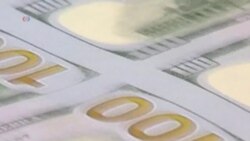U.S. President Barack Obama’s nominee to be America’s next central bank chief, current Federal Reserve Vice Chair Janet Yellen, said the U.S. economy must grow faster at her confirmation hearing before the Senate Banking Committee Thursday.
If confirmed, Yellen would succeed outgoing Federal Reserve Chairman Ben Bernanke, under whose leadership the U.S. central bank launched an unprecedented stimulus program to keep interest rates at historic lows and boost the money supply.
Yellen told senators the economy has improved since the deep recession of 2008-2009, but still needs help.
“Our country has come a long way since the dark days of the financial crisis. But we have further to go," she said. "I believe the Federal Reserve has made significant progress towards its goals, but has more work to do.”
That work includes further reductions in U.S. unemployment, which stands at 7.3 percent. Yellen described promoting stronger economic growth as “imperative."
The committee’s top Republican, Senator Mike Crapo, did not dispute the need for more robust growth, but worried that massive monetary stimulus, known as quantitative easing, will eventually cause a spike in inflation and other side effects.
“How do you respond to the concerns that quantitative easing has limited impact on economic growth and is, in fact, creating very serious risks in our financial markets,” he asked.
Yellen said she understands and shares the concerns.
“I would agree that this program cannot continue forever, that there are costs and risks associated with the program," she said. "We are monitoring those very carefully."
Yellen made clear that, for now, her top concern is a lackluster U.S. economy.
U.S. financial markets have responded favorably to Yellen’s nomination. The Dow Jones Industrial Average hit a record high this week, and advanced further during her testimony on Capitol Hill. Yellen is likely to receive bipartisan support in both the Banking Committee and the full Senate. She would become America’s first female central bank chief.
Ben Bernanke’s term expires in January. The Federal Reserve plays a major role in U.S. interest rates and, by extension, those of other nations around the world.
Fed Chief Nominee: Stronger US Growth 'Imperative'
CAPITOL HILL —






